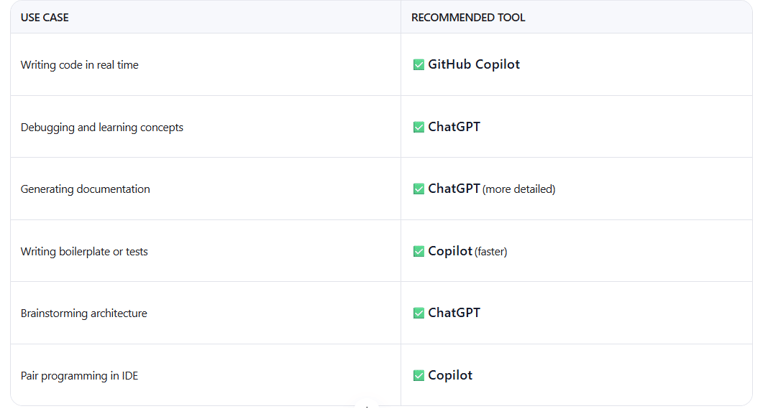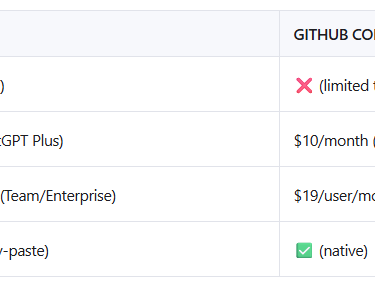ChatGPT vs Copilot: Which Is Better for Developers in 2025?
ChatGPT and GitHub Copilot are two of the most powerful AI tools for developers—but which one is right for you? In this 2025 comparison, we break down their strengths: Copilot excels at real-time, context-aware code suggestions directly in your IDE, while ChatGPT shines in explaining concepts, debugging errors, and generating detailed technical guidance. Discover how each tool fits into your workflow, and learn why the smartest developers use both together to code faster and learn better.
David Ayomidotun
8/2/20253 min read


As artificial intelligence becomes deeply embedded in software development, two names dominate the conversation: ChatGPT and GitHub Copilot. Both are powerful AI tools developed by OpenAI (with Microsoft backing), but they serve different purposes—and choosing the right one can make a big difference in your coding workflow.
In this article, we break down the key differences, strengths, and ideal use cases for ChatGPT and GitHub Copilot, helping developers decide which tool is better suited for their needs in 2025.
What Are ChatGPT and GitHub Copilot?
- ChatGPT: A general-purpose AI chatbot developed by OpenAI, capable of answering questions, writing content, explaining code, brainstorming ideas, and even generating scripts in multiple programming languages. It’s designed for broad conversational understanding and reasoning.
- GitHub Copilot: An AI-powered code completion tool developed by GitHub (a Microsoft subsidiary) in collaboration with OpenAI. Built directly into your IDE, it suggests entire lines or blocks of code in real time as you type.
While both tools use similar underlying AI models (such as GPT-4 or GPT-5 in 2025), their purpose, integration, and performance in development workflows differ significantly.
1. Integration & Workflow: Copilot Wins for Real-Time Coding
GitHub Copilot is designed to be seamlessly embedded into popular IDEs like Visual Studio Code, JetBrains, and Visual Studio. It works in the background, analyzing your code context and offering inline suggestions—almost like a pair programmer.
- ✅ Auto-suggests functions, loops, and boilerplate code
- ✅ Adapts to your coding style and project structure
- ✅ Works offline with cached models (in Copilot X)
ChatGPT, on the other hand, operates through a chat interface (web or app). You must describe your problem, wait for a response, then copy-paste the code into your editor.
- ❌ Disrupts flow with context switching
- ❌ No real-time integration with your codebase
- ✅ Great for brainstorming and high-level planning
Verdict: For writing code inside your editor, Copilot is far more efficient.
2. Code Quality & Accuracy: Copilot Is More Context-Aware
While ChatGPT can generate syntactically correct code, it often lacks awareness of your current file, project dependencies, or variable names. This can lead to generic or incompatible suggestions.
Copilot, however, analyzes:
- The file you're editing
- Nearby functions and imports
- Your project’s language framework
This contextual awareness leads to more accurate, relevant, and immediately usable code—especially for repetitive tasks like writing API endpoints, unit tests, or data transformations.
Example:
You type:
```python
# Function to fetch user data from API
def get_user(id):
```
Copilot instantly suggests:
```python
url = f"https://api.example.com/users/{id}"
response = requests.get(url)
return response.json() if response.status_code == 200 else None
ChatGPT could do this too—but only if you ask it explicitly and provide full context.
**Verdict:** Copilot delivers higher-quality, context-sensitive code during active development.
3. Problem Solving & Learning: ChatGPT Excels at Explanation
Where ChatGPT shines is in teaching, debugging, and exploration. Need to understand a complex algorithm? Fix a cryptic error message? Learn a new framework?
ChatGPT can:
- Explain code line by line
- Suggest multiple solutions with trade-offs
- Generate learning plans or coding exercises
- Translate code between languages
It’s like having a senior developer or tutor on call 24/7.
Example:
You ask:
“Why am I getting a ‘Cannot read property ‘map’ of undefined’ in React?”
ChatGPT responds with a clear explanation, likely cause (uninitialized state), and a fix.
Copilot cannot do this—it doesn’t engage in dialogue or debug conceptually.
Verdict: For learning, debugging, and conceptual help, ChatGPT is unmatched.
4. Customization & Enterprise Use
- Copilot now offers Copilot Enterprise, which can be trained on your private codebase, understands internal APIs, and enforces company coding standards.
- ChatGPT Team/Enterprise allows custom GPTs, knowledge base uploads, and API access—but still lacks deep codebase integration.
For large organizations, Copilot integrates better with DevOps pipelines, offering security scanning, test generation, and pull request summaries.
5. Cost & Accessibility
While ChatGPT is more affordable for general use, Copilot offers better value for active coders.
So, Which Is Better for Developers?
It’s not an either/or—it’s a “both, but differently.”
The Smart Developer’s Strategy in 2025
The most effective developers use both tools together:
1. Use ChatGPT to plan, understand, and debug.
2. Use Copilot to implement, iterate, and ship code faster.
Think of it this way:
- ChatGPT = Your coding mentor
- GitHub Copilot = Your coding autopilot
Used in tandem, they form a powerful AI-powered development duo.
Final Verdict
> For pure coding speed and integration: GitHub Copilot wins.
> For explanation, learning, and flexibility: ChatGPT wins.
If you had to pick one tool as a professional developer, GitHub Copilot will save you more time in daily coding. But if you're learning, troubleshooting, or designing systems, ChatGPT is indispensable.
In 2025, the best developers aren’t choosing between ChatGPT and Copilot—they’re mastering both.
By David Ayomidotun, AI & Developer Tools Analyst
Stay ahead of the curve with insights on AI, coding, and the future of software development.



